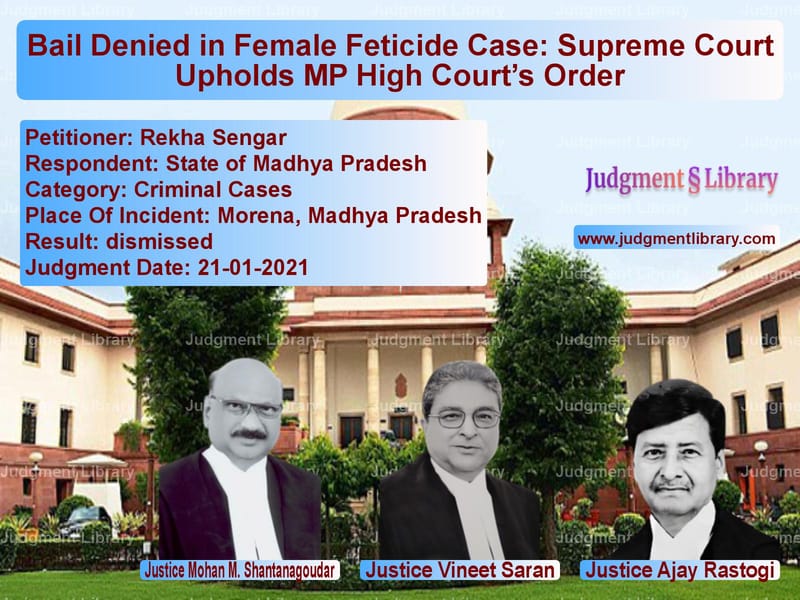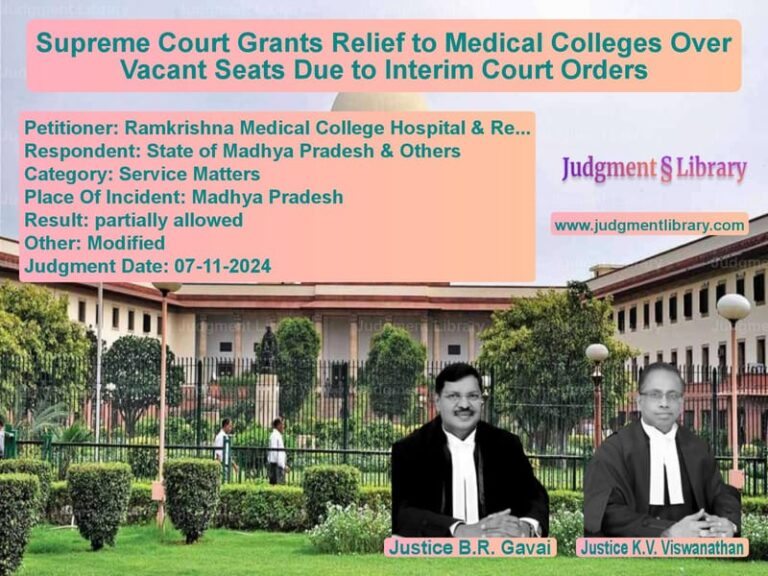Bail Denied in Female Feticide Case: Supreme Court Upholds MP High Court’s Order
The Supreme Court recently upheld the Madhya Pradesh High Court’s decision to deny bail to Rekha Sengar, who was accused of conducting illegal pre-natal sex determination and abortion of female fetuses. This case highlights the severity of female feticide and the stringent legal framework under the Pre-Conception and Pre-Natal Diagnostic Techniques (PC&PNDT) Act.
The petitioner, Rekha Sengar, was accused of violating multiple provisions of the PC&PNDT Act and the Medical Termination of Pregnancy Act, 1971. The case came into focus after a sting operation conducted by officials, leading to the recovery of medical instruments used for illegal sex determination and abortion. The Madhya Pradesh High Court had denied her bail based on the gravity of the offense, prompting her to approach the Supreme Court.
Background of the Case
On 26 September 2020, an FIR was registered at PS City Kotwali, Morena, Madhya Pradesh, alleging that Rekha Sengar and another individual were engaged in illegal pre-natal sex determination and abortions without proper registration or licensing. A sting operation was carried out by the PC&PNDT Advisory Committee, the Nodal Officer, and lady police officers, wherein an undercover pregnant woman approached the petitioner seeking sex determination and abortion services. The petitioner allegedly accepted Rs. 7,000 for performing these illegal acts.
Upon conducting a raid at her residence, authorities recovered an unregistered ultrasound machine, medical instruments, and substances used for sex determination and abortion. The charge sheet filed against her included violations under the Indian Penal Code, the Medical Termination of Pregnancy Act, and the PC&PNDT Act.
Legal Provisions and Concerns
The case hinges on multiple legal provisions that criminalize pre-natal sex determination and female feticide. Sections 6 and 23 of the PC&PNDT Act explicitly prohibit the use of diagnostic techniques to determine the sex of a fetus, making any violation a criminal offense. Section 27 further classifies these offenses as non-bailable, non-compoundable, and cognizable, emphasizing their seriousness.
The Supreme Court reiterated that in non-bailable cases, the court must consider the nature and gravity of the offense, its societal impact, and the presence of a prima facie case against the accused. The Court observed:
“It is well settled that in non-bailable cases, the primary factors the court must consider while exercising the discretion to grant bail are the nature and gravity of the offense, its impact on society, and whether there is a prima facie case against the accused.”
Petitioner’s Arguments
- The petitioner argued that she had been in custody since September 2020 and had already spent considerable time behind bars without trial.
- She contended that her co-accused had been granted bail, and therefore, she should be granted the same relief on grounds of parity.
- She asserted that the allegations against her were exaggerated and that she had no criminal record.
- She maintained that there was insufficient evidence linking her directly to the alleged offenses.
Respondent’s Arguments
- The State opposed the bail, emphasizing the grave nature of the offense.
- It was argued that the petitioner played an active role in conducting illegal medical practices, including sex determination and abortion.
- The respondent highlighted the detailed sting operation findings, which provided conclusive proof of her involvement.
- They pointed to the legislative intent of the PC&PNDT Act, which aims to curb female feticide and protect gender equality.
Supreme Court’s Observations and Judgment
The Supreme Court took a strict stance against the petitioner’s actions, emphasizing that female feticide is a social evil that must be curbed with stringent legal measures. The Court noted that India’s declining sex ratio has been a major concern, with laws such as the PC&PNDT Act enacted to prevent such practices.
The Court observed:
“The passage of this Act was compelled by a cultural history of preference for the male child in India, rooted in a patriarchal web of religious, economic, and social factors.”
Referring to previous rulings, the Court stated that violations of the PC&PNDT Act have long been overlooked, leading to an alarming gender imbalance. It cited the case of Voluntary Health Association of India v. State of Punjab (2013) 4 SCC 1, which emphasized the need for strict enforcement of the Act.
The Court also rejected the petitioner’s plea for bail on grounds of parity with the co-accused, noting that the co-accused had a lesser role in the alleged offenses. The petitioner, on the other hand, was directly involved in conducting illegal sex determination and abortion procedures.
Ultimately, the Supreme Court upheld the High Court’s decision to deny bail, stating:
“A strict approach has to be adopted if we are to eliminate the scourge of female feticide and iniquity towards girl children from our society.”
Conclusion
This judgment reinforces the judiciary’s commitment to curbing female feticide and upholding gender equality. The Supreme Court’s firm stance on bail denial in such cases serves as a strong deterrent against illegal sex determination and abortion practices.
While dismissing the bail plea, the Court granted the petitioner the liberty to request an expedited trial, directing the Trial Court to conclude the proceedings within one year. The ruling underscores the importance of stringent enforcement of the PC&PNDT Act to protect the rights of the girl child and uphold the principles of justice.
Petitioner Name: Rekha Sengar.Respondent Name: State of Madhya Pradesh.Judgment By: Justice Mohan M. Shantanagoudar, Justice Vineet Saran, Justice Ajay Rastogi.Place Of Incident: Morena, Madhya Pradesh.Judgment Date: 21-01-2021.
Don’t miss out on the full details! Download the complete judgment in PDF format below and gain valuable insights instantly!
Download Judgment: rekha-sengar-vs-state-of-madhya-prad-supreme-court-of-india-judgment-dated-21-01-2021.pdf
Directly Download Judgment: Directly download this Judgment
See all petitions in Bail and Anticipatory Bail
See all petitions in SC/ST Act Case
See all petitions in Judgment by Mohan M. Shantanagoudar
See all petitions in Judgment by Vineet Saran
See all petitions in Judgment by Ajay Rastogi
See all petitions in dismissed
See all petitions in supreme court of India judgments January 2021
See all petitions in 2021 judgments
See all posts in Criminal Cases Category
See all allowed petitions in Criminal Cases Category
See all Dismissed petitions in Criminal Cases Category
See all partially allowed petitions in Criminal Cases Category







